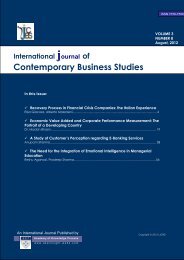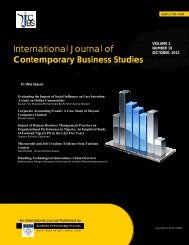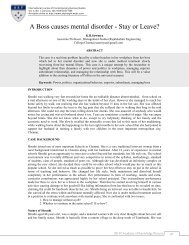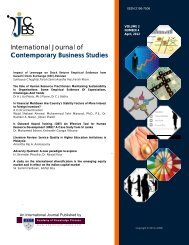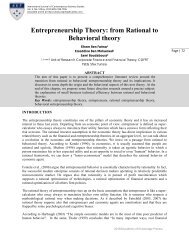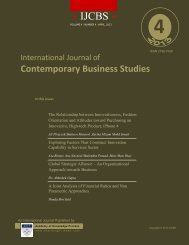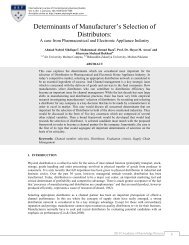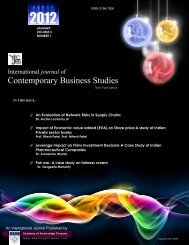Contemporary Business Studies - Academy of Knowledge Process ...
Contemporary Business Studies - Academy of Knowledge Process ...
Contemporary Business Studies - Academy of Knowledge Process ...
Create successful ePaper yourself
Turn your PDF publications into a flip-book with our unique Google optimized e-Paper software.
International Journal <strong>of</strong> <strong>Contemporary</strong> <strong>Business</strong> <strong>Studies</strong>Vol: 4, No: 2. February, 2013 ISSN 2156-7506Available online at http://www.akpinsight.webs.comFUTURE RESEARCH IMPLICATIONSFor future researchers there is a wide area to study the international diversification and validate ourhypothetical model. Studying company’s diversification regions and their success failure ratio would be agood study to test our model.A longitudinal study can also be conducted to test our propositions by identifying firms with highinternational diversification exposure. Due to intensive criticism on h<strong>of</strong>sted’s national culture dimensionsa new study is required which can account the dimensions <strong>of</strong> GLOBE study and come up with newnational scores and that study will be landmark in validation <strong>of</strong> our hypothetical model.Our study has practical implications for top management <strong>of</strong> multinational companies involved ininternational diversification and it mitigates the risk <strong>of</strong> diversification failure in case <strong>of</strong> diversifying in asame zone identified by us.LIMITATIONS OF THE STUDY• Performance has been used as a measure <strong>of</strong> different outcomes; we included all those in ourumbrella <strong>of</strong> performance as a dependant variable that may affect the causality <strong>of</strong> our propositions.• We focused and limited the performance with the post diversification integration.• Its very difficult to comprehend and explain the all dimensions <strong>of</strong> culture and conclude as a wholethat national culture dimension moderated the relationship• We used h<strong>of</strong>sted score to support our hypothetical model which is widely criticized in literature.We don’t have any other score for reference so we proposed in our future research that a newvalid study is required which encounter the flaws in h<strong>of</strong>sted’s study and come up with newnational culture scores <strong>of</strong> the world.REFERENCESAdner, R. and Levinthal, D. (2001) 'Demand heterogeneity and technology evolution: implications forproduct and process innovation', Management Science 47: 611-628.Ans<strong>of</strong>f, I.H. (1965) Corporate Strategy: An Analytic Approach to <strong>Business</strong> Policy for Growth andExpansion, McGraw-Hill: New York.Aaker, D., ‘(1980).Marketing Research: Private and Public Sector Decisions, New York: Wiley,Andrews, K.R., (1980)The Concept <strong>of</strong> Corporate Strategy, Homewood, IL: Richard D. Irwin,.Berry, Charles H., Corporate Growth and Diversification, Princeton, NJ: Princeton University Press,1975.Buhner, R. (1987) 'Assessing international diversification <strong>of</strong> West German corporations', StrategicManagement Journal 8(1): 25-37.Barkema, H.G. and Vermeulen, F. (1997) 'What differences in the cultural backgrounds <strong>of</strong> partners aredetrimental for international joint ventures?', Journal <strong>of</strong> International <strong>Business</strong> <strong>Studies</strong> 28(4):845-864.Bartlett, C. A. (1986). Building and managing the transnational: The new organizational challenge. In M.E.Brock, D. M., Barry, D., & Thomas, D. C. (2000). Your forward is our reverse, your right, our wrong:Rethinking multinational planning processes in light <strong>of</strong> national culture. International <strong>Business</strong>Review, 9(6), 687–701.Bhide Amar, “Reversing Corporate Diversification,” in Donald H. Chew, Jr. (ed.), The New CorporateFinance: Where Theory Meets Practice, New York, NY: McGraw-Hill, Inc., 1993, pp. 526-537.Berger, P.L. and Luckmann, T. (1967) The Social Construction <strong>of</strong> Reality: A Treatise in the Sociology <strong>of</strong><strong>Knowledge</strong>, London: The Penguin Press.Bowman, E. H. (1982). ‘Risk seeking by troubled firms’, Sloan Management Review, 23, pp. 33–42.2013©<strong>Academy</strong> <strong>of</strong> <strong>Knowledge</strong> <strong>Process</strong>97



